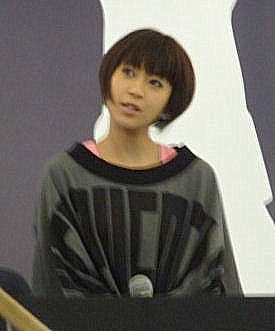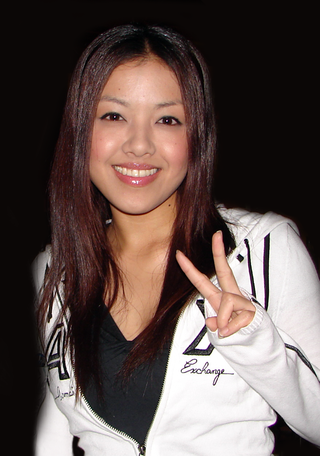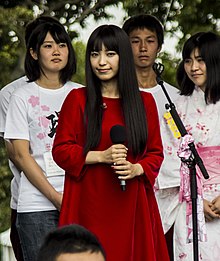
Japanese singer Ayumi Hamasaki has released eighteen studio albums, five compilation albums, twenty-six remix albums, four live albums and numerous singles and promotional singles. She debuted in 1995 under Nippon Columbia with the stage name Ayumi, releasing an extended play Nothing from Nothing, which was a collaboration with Dohzi-T and DJ Bass. Three years later, Hamasaki debuted again as a singer under Avex Trax with the single "Poker Face" (1998). Her first album A Song for ×× (1999) debuted at number one on Oricon's albums chart, and sold over 1.4 million copies.

The discography of Japanese-American R&B and pop singer Hikaru Utada consists of eleven studio albums, four compilation albums, eleven video albums and numerous singles and promotional singles. Utada began as a musician in the early 1990s as a member of U3, a family unit made up of her, her mother Junko Utada, also known as 1970s enka singer Keiko Fuji, and her father, musical producer Teruzane Utada. U3 released their debut album Star in 1993, with the hope to debut in America. In 1996, the group was rebranded as Cubic U, an R&B project focusing on Hikaru Utada, resulting in the English language album Precious in 1998 with record label Toshiba EMI.

The discography of Japanese recording artist Namie Amuro contains 12 studio albums, 7 compilation albums, 47 singles, 10 live albums, 14 video albums and 102 music videos. Amuro has also collaborated with Verbal of M-Flo and Ryōsuke Imai for her Suite Chic project.

The discography of Mika Nakashima includes 11 studio albums, 7 compilation albums, 45 singles and 20 video albums. These have all been released through Sony Music Entertainment Japan.

The discography of Japanese-American musician Yuna Ito consists of three studio albums, one compilation album and nineteen singles. Her debut album, Heart, was released in 2007 after six singles, including one of the two theme songs for the film Nana, "Endless Story" (2005), which also featured Ito in her acting debut, as well as "Precious" (2006), the theme song of the film Limit of Love: Umizaru. Both of these songs were very commercially successful, becoming certified by the RIAJ.

The discography of Japanese contemporary R&B singer Crystal Kay consists of 12 studio albums, three extended plays, five compilation albums, four video albums and numerous single releases. Crystal Kay debuted as a singer at 13 years of age in 1999 under Epic Records Japan. Her third album Almost Seventeen (2002) saw a great leap in popularity for Crystal Kay, reaching number two on Oricon's albums chart. In 2005, Crystal Kay sang the eponymous theme song for the Tsuyoshi Kusanagi drama Koi ni Ochitara: Boku no Seikō no Himitsu. "Koi ni Ochitara" became Crystal Kay's most successful single, being certified for a million ringtone downloads.
The discography of Ayaka consists of six studio albums, two compilation albums, a cover album and numerous singles, released through Warner between 2006 and 2009, and through Ayaka's independent label, A Station, from 2012 onwards.

The discography of Japanese pop and electronic dance group Perfume consists of seven studio albums, three compilation albums, twenty-eight singles and six video albums. Forming in 2001, the group debuted as local Hiroshima idols, releasing two singles through the independent Momiji Label. In 2003, the members moved to Tokyo to further their career as idols. Signing with independent label Bee-Hive Records, the group met electronic producer Yasutaka Nakata of the band Capsule, who began to produce their music from 2003 onward.
The discography of Japanese singer Thelma Aoyama consists of seven studio albums, six compilation albums, one extended play, one remix album, one cover album, two video albums and numerous solo and collaboration singles. Aoyama debuted as a musician in 2007 under Universal Music Japan sublabel Universal J, and became famous through her collaboration song with rapper SoulJa, "Koko ni Iru yo". Aoyama's version "Soba ni Iru ne" became one of the most successful songs of all time in Japan, certified for three million ringtone downloads and three million downloads by the RIAJ.
The discography of Japanese R&B and pop singer Ken Hirai consists of ten studio albums, two compilation albums, one remix album, three cover albums, thirteen video albums and numerous singles and promotional singles. Hirai debuted as a musician under Sony Music Records in 1995 with the single "Precious Junk", but found success five years later with the single "Lakuen" and his third album, The Changing Same.

The discography of Japanese musician Kaela Kimura consists of eleven studio albums, two compilation albums, one cover album, four extended plays, thirty-one singles and five video albums. She debuted as a musician in 2004 under the label Columbia Music Entertainment, releasing ten albums with the company. In 2013, Kimura released Rock, an album of English language covers under her private label Ela Music. In 2014, Kimura released "Ole! Oh!", her first single under Victor Entertainment.

The discography of Japanese recording artist and actor Masaharu Fukuyama consists of ten studio albums, four compilation albums, three remix albums, twenty video albums, and numerous physical and promotional singles. Fukuyama debuted through BMG Japan by releasing the single "Tsuioku no Ame no Naka" (1990) and the album Dengon. The works failed to chart, however, in 1992 the single "Good Night", aided by the popularity it gained through use in the drama Ai wa Dō da, charted on the Oricon Singles Chart, peaking at number nine. In 1993, his album Calling became his first number one album on the Oricon Albums Chart; it has sold over 850,000 copies in Japan and has been certified two-times platinum by the Recording Industry Association of Japan (RIAJ).
The discography of the Japanese rock band Radwimps consists of thirteen studio albums, ten video albums, and 32 singles. Radwimps debuted as a musical act in 2003 through independent label Newtraxx, releasing the albums Radwimps (2003) and Radwimps 2: Hatten Tojō (2005). After being signed to major label Toshiba EMI, the band released their album Radwimps 3: Mujintō ni Motte Ikiwasureta Ichimai to increasing commercial success.
The discography of Japanese musical act Superfly consists of seven studio albums, four compilation albums, three extended plays, five video albums and thirty-four singles. Superfly began as a duo in 2003 by vocalist Shiho Ochi and guitarist Koichi Tabo; signing with Warner Music Japan in 2007. Tabo left the band in 2007 just before the release of their single "I Spy I Spy", finding it difficult to work as both the act's songwriter and guitarist. However, Tabo remained attached to Superfly, composing and producing songs for the unit until Superfly's single "Ai o Karada ni Fukikonde" (2014) and Superfly's fifth studio album White (2015), where Ochi collaborated with a range of songwriters instead.
The discography of Japanese musical act Rip Slyme consists of ten studio albums, four compilation albums, two extended plays, one live album, eight video albums and thirty-three singles. Rip Slyme debuted as an independent act on File Records in 1995, releasing material with them until their major label debut under Warner Music Japan in 2000. The band's second album under Warner, Tokyo Classic (2002) was a commercial success, selling over 1,000,000 copies.
The discography of Tokyo Jihen consists of five studio albums, three compilation albums, one regular release extended play, three vinyl exclusive extended plays, and 13 video releases, released through Toshiba EMI, EMI Music Japan and Universal between 2004 and 2013.
The discography of Japanese pop duo Dreams Come True consists of 20 studio albums, 6 compilation albums, 17 video albums, and numerous singles. The band was formed in 1988 by Miwa Yoshida, Masato Nakamura, and Takahiro Nishikawa as Cha-Cha & Audrey's Project, which was later changed to Dreams Come True. The first single "Anata ni Aitakute" did not chart, but their eponymous debut album sold over a million copies in Japan and was certified Million by the Recording Industry Association of Japan (RIAJ). The follow-up albums also performed well on the charts, with the 1989 release Love Goes On... lingering on the Oricon Albums Chart for four years. The group's fifth studio album The Swinging Star (1992) was at one point, the best-selling album in Japan, shifting over 3.7 million copies in the country.
The discography of Japanese pop singer Kana Nishino consists of seven studio albums, six compilation albums, one EP, thirty-four singles and ten video albums. Nishino debuted in 2008 under Sony Music Japan, and gained national recognition with the singles "Tōkutemo" and "Kimi ni Aitaku Naru Kara" (2009). Nishino has released some of the most digitally successful songs in Japan: "Motto..." (2009), "Dear..." (2009), "Best Friend" (2010), "Aitakute Aitakute" (2010), "If" (2010) and "Kimi tte" (2010), all of which were certified million by the RIAJ.
The discography of Japanese pop and jazz vocalist Juju consists of six studio albums, four tribute albums, two extended plays, two live albums, five video albums and numerous singles. Juju debuted as a singer in 2001, collaborating with artists such as DJ Masterkey, Spontania and worked on the soundtrack for the film Kyōki no Sakura.

"Tsuretette Tsuretette" is a single by Japanese pop duo Dreams Come True, from their fifteenth studio album, Do You Dreams Come True? (2009), released on November 12, 2009, through Universal Music Japan. The title track was written by the band's singer and songwriter Miwa Yoshida, and produced by Masato Nakamura. The single debuted at number one on the Oricon Singles Chart, becoming the group's first single to top the chart in ten years. It has sold about 86,000 copies in Japan and has been certified Gold by the Recording Industry Association of Japan (RIAJ).










